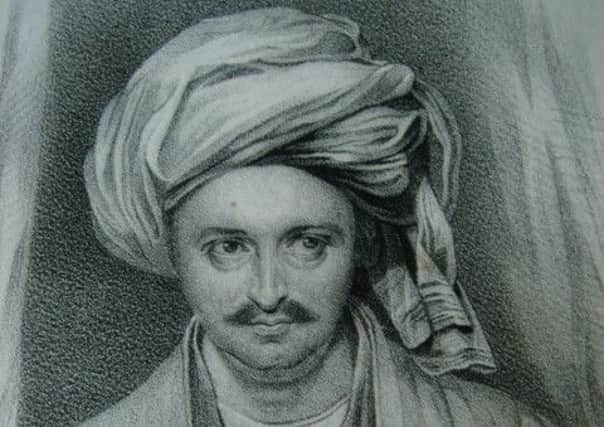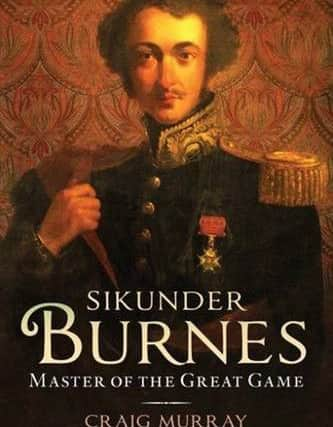Relative of Robert Burns was '˜Victorian James Bond'


The life of Captain Sir Alexander Burnes, which featured spying, sex, treachery and double crossing agents has been revealed in a book by Craig Murray, the former British ambassador to Uzbekistan.
Mr Murray says he consulted “thousands of manuscripts” during his research for Sikunder Burnes, Master of the Great Game to uncover the truth about the spy, whose father was the bard’s first cousin.
Advertisement
Hide AdAdvertisement
Hide AdAt age 26, Alexander Burnes was one of the first agents to be sent to Afghanistan by British Intelligence in 1831 as tensions rose between Britain and Russia over ownership of India.


He travelled in disguise, and while journeying 1,000 miles up the Indus river, Burnes was involved in double-crossing deals, secret mapping and espionage.
Mr Murray discovered these previously unpublished details along with evidence of British secret service smuggling arms to Chechen and Dagestani rebels as early as the 1830s in a bid to persuade them to wage “jihad” against Russia.
He also learned that Alexander, along with his brother James, invented the myths linking the Knight’s Templar to Scottish Freemasonry.


These legends went on to inspire books such as Dan Brown’s Da Vinci Code and Foucault’s Pendulum by Umberto Eco.
Mr Murray said: “When I stared writing about Alexander Burnes it was because he had been a diplomat in the same part of the world as me.
“But it quickly took me to all sorts of discoveries about the myths of the Knights Templar and Scottish Freemasons.”
Advertisement
Hide AdAdvertisement
Hide AdAlexander’s brother James published these in 1837, in Sketch of the History of the Knights Templar.
Mr Murray said: “I’ve tried very hard to find any earlier mention and it is not there. So it seems like James and Alexander invented it.”
He also claims James Burnes rose rapidly through the ranks of the Freemasonry, after learning of stories of secret symbols in Afghanistan and Freemasonry documents in the Church of Saint-Sulpice in Paris.
Alexander was killed in Kabul in 1841.
Mr Murray’s research has found detailed accounts of spy techniques.
He said: “Burnes would be disguised as a traveller but counted his paces as he went in order to map.”
“The maps were drawn secretly at night in his tent. They would then be crushed down in amulets to be smuggled out and sent back by messengers who were themselves travelling in disguise.
“There was lots of double dealing - intercepting letters from the Russians, the use of complex codes to foil the other side.
Advertisement
Hide AdAdvertisement
Hide Ad“His sex life was also interesting. All of the histories repeat claims that it was his active sex life with Afghan women which motivated the Afghan uprising...But I couldn’t find any evidence.
“What I did find was very definite evidence that he took a harem of women who he had been travelling with for three or four years.”
He believes Robert Burns would have been proud of his descendant.
Professor Gerrard Carruthers, director of the Robert Burns Centre at Glasgow University, said there were parallels between the two men.
He added: “Burns himself was famously a Freemason and at the time it was associated with being cosmopolitan in outlook, intellectual and adventurous...Perhaps Alexander was imbibing something of the spirit of his uncle in his adventures.”
When Mr Murray was ambassador in Tashkent, he accused the administration, under recently deceased president Islam Karimov, of human rights abuses.
He was removed from his post on October 2004.
Advertisement
Hide AdAdvertisement
Hide AdA petition urging the US to reverse a decision to deny Mr Murray the right to enter the country without a visa has been signed by 15,000 people.
Sikunder Burnes, Master of the Great Game, will be published next month.